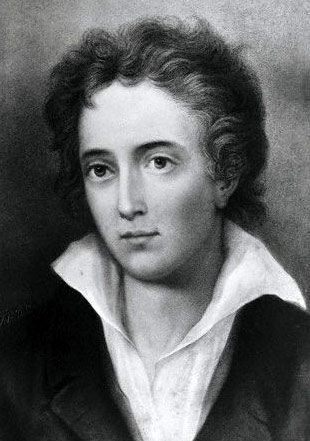March 25: Shelley Expelled for Atheism
Percy Bysshe Shelley Expelled for “The Necessity of Atheism” (1811)
It was on this date, March 25, 1811, that Oxford University student and future poet Percy Bysshe Shelley was expelled for publishing the pamphlet “The Necessity of Atheism.” As he would later distinguish himself, Shelley was one of the major English Romantic poets. Shelley was also famously friends with poets John Keats and Lord Byron, and as the husband of Mary Shelley, his second wife.
Shelley (1792-1822) came to Oxford in April 1810, where legend has it that he attended only one lecture, but frequently read sixteen hours a day. In that same year, he wrote a Gothic novel, Zastrozzi, in which he debuted his atheism under cover of the villain Zastrozzi. The next year, Shelley wrote another gothic novel and an unsigned pamphlet, called “The Necessity of Atheism,” which nevertheless was traced to him. He was called to appear before the College’s fellows, including the Dean, George Rowley, and they demanded that he deny authorship of the tract. This Shelley refused to do. Thinking it too dangerous for Shelley to pursue truth at a university, the administration at Oxford expelled Shelley, the administration at Oxford expelled Shelley, along with his friend, Thomas Jefferson Hogg.
Actually, the administrative sentence passed was called “rustication,” which means he was sent down or expelled temporarily. Since the word derives from the Latin rus, meaning countryside, a student, in tradition, was sent back to their family in the country – or, if you take the medieval Latin root, rusticorum, the student was sent to dwell “among the heathens or barbarians.” So unchastened was Shelley, that he published a revised and expanded version of “The Necessity of Atheism” in 1813. All this seems not to have injured in the slightest Shelley’s later literary success.
What was so dangerous about “The Necessity of Atheism”? In it, Shelley made a number of claims. One, about which today there should be no argument, is that beliefs are involuntary, and, therefore, since atheists cannot choose to be “without god,” they should not be persecuted. As Shelley put it,
Hence it is evident that, having no proofs from either of the three sources of conviction [senses, reason, testimony], the mind cannot believe the existence of a creative God: it is also evident that, as belief is a passion of the mind, no degree of criminality is attachable to disbelief; and that they only are reprehensible who neglect to remove the false medium through which their mind views any subject of discussion. Every reflecting mind must acknowledge that there is no proof of the existence of a Deity.
Shelley perhaps anticipated what we today call the “God of the Gaps” when he wrote,
If ignorance of nature gave birth to gods, knowledge of nature is made for their destruction. In proportion as man taught himself, his strength and his resources augmented with his knowledge; science, the arts, industry, furnished him assistance; experience reassured him or procured for him means of resistance to the efforts of many causes which ceased to alarm as soon as they became understood. In a word, his terrors dissipated in the same proportion as his mind became enlightened. The educated man ceases to be superstitious.
But perhaps the most perceptive argument in “The Necessity of Atheism” echoes an observation by French-German author Paul-Henri Thiry, Baron d’Holbach (1723-1789):
If [God] is infinitely good, what reason should we have to fear him? If he is infinitely wise, why should we have doubts concerning our future? If he knows all, why warn him of our needs and fatigue him with our prayers? If he is everywhere, why erect temples to him? If he is just, why fear that he will punish the creatures that he has filled with weaknesses? If grace does everything for them, what reason would he have for recompensing them? If he is all-powerful, how offend him, how resist him? If he is reasonable, how can he be angry at the blind, to whom he has given the liberty of being unreasonable? If he is immovable, by what right do we pretend to make him change his decrees? If he is inconceivable, why occupy ourselves with him? IF HE HAS SPOKEN, WHY IS THE UNIVERSE NOT CONVINCED?
Although underappreciated in his time, on account of his political and religious beliefs, Shelley’s talent and idealism leave him remembered today as among the finest lyric poets in the English language. “The Necessity of Atheism,” when you can find it in print, is remembered today as among the classics of Freethought.
Originally published March 2011 by Ronald Bruce Meyer.


